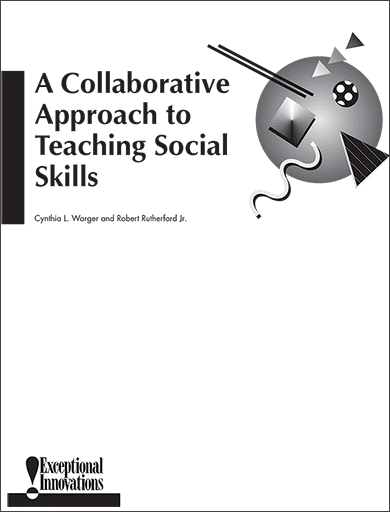
A Collaborative Approach to Teaching Social Skills

Available as eBook Only
Authors: Cynthia Warger and Robert Rutherford
ISBN 1-931311-01-3
$9.99 / #e-CAT369
Add to CartUse this 300-page training package to learn how to teach critical classroom social skills to students (K-8) in inclusive classrooms and schools. The package offers practical instructional strategies for educators—teachers, special educators, school psychologists, social workers, guidance counselors, and teacher educators—who are working alone or in collaborative partnerships to develop social skills in all students. A special section provides strategies for teaching social skills to students with behavioral difficulties. The manual includes blackline masters, sample activities from teachers who have successfully piloted the approach, assessment forms, and teacher-developed scope and sequence materials for the most commonly taught social skills. An accompanying mpeg shows how teachers across the country have used the social skills approach with diverse student populations.
Table of Contents
A Collaborative Approach to Teaching Social Skills
2. Getting Started: An Overview
3. The Teaching Social Skills Program
4. Facilitator’s Guide: Teaching Social Skills Program
with Sarup Mathur
5. Teaching Social Skills in the Classroom
6. Implementing A Collaborative Approach to Teaching Social Skills
References
Appendices
A. Rationale for Social Skills Training
B. Applying a Collaborative Model
C. Collaborative Structures
D. Definition of Social Skills
E. Types of Social Skills
F. A Collaborative Approach to Teaching Social
Skills Framework
G. Instructional Strategies for Teaching Social Skills
H. Social Competence Screening Form
I. Self-Report Form
J. Student-Social Skills Matching Form
K. Accepting the Answer No
L. Compromising with Peers
M. The Teaching Social Skills Model
N. Selected Social Skills
O. Assumptions of the Teaching Social Skills Program
P. Students with Withdrawn Behaviors
Q. Students with Immature Behaviors
R. Students with Aggressive Behaviors
S. Defining Social Skills
T. Behaviors or Not Behaviors Activity
U. Recording Tools
V. Guidelines for Event Recording.
W. Guidelines for Duration Recording
X. Guidelines for Time Sampling
Y. Time Sample Recording
Z. Time Sample Recording—Reliability
AA. Following Directions
BB. Following Directions—Steps
CC. Criteria for Modeling
DD. Self Control
EE. Sample Record Card for Asking Questions
FF. Changing Conditions or ABC Design
GG. Multiple Baselines
HH. First Grade Social Skills with Beth Yglesias and Cleland Strickland
II. Lesson Plan: Waiting One’s Turn with Wendy Foss and Koleen Martinez
JJ. Lesson Plan: Fairy Tales with Beth Yglesias
KK. Sample Lesson Plans with Nora Miller, Beth Yglesias, Debbie Guedry, Frankie Day, Tot Swanson and Mary Nell Dominique
LL. Workshop Agenda
MM. Entry Points for Identification
NN. Listening
OO. Conflict Resolution with Beth Yglesias and Debbie Guedry
PP. Respect Exercise
QQ. Sample Activity
RR. Teaching Social Skills Log
SS. Collaboration Log
TT. Teaching Listening Skills with Jan Greenwell
UU. Field-based Social Skills Training for Preservice Educators with Jo Cleland and Peggy George
VV. What Makes Collaboration Difficult In a Social Skills Context
WW. The Time Issue: Ideas
XX. Skip
YY. Following Directions
ZZ. Social Skills Baseline Form
Read an excerpt of this publication in PDF.
